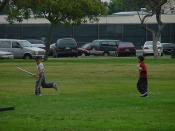We can learn many things when looking at primal religions. Primal religions were the first religions of man and few remnants can be seen in religions of today. They show us that the major historical religions of today aren't the only way things have been done. These "modes of religiosity" were tribal because they had very small groupings. Looking at primal religions, we get the feeling that they are closer to the truth than many are today. Many of these religions continue to this day in Africa, Southeast Asia, and Australia. With the later civilization of man, came polytheistic and monotheistic religions and possibly the loss of many insights and virtues.
These peoples seem to be much more spiritual than people of today because they were much more concerned with the earth and it's surroundings. The present ways of man are exactly the opposite. People of primal religion didn't use their imaginations; they saw things as they were and nothing more.
As in the Australian aboriginal religion they had contact with their "larger than life" figures and "participated in" the acting out of archetypal paradigms. There were no divisions like we see with historical religions. In the aboriginal religion, there were no congregations, or deacons, or bishops, or priests. There was "only the Dreaming and conformance to it."
The orality used in these primal religions shows us that our advanced writing techniques cannot stand up to speech. The effectiveness of speaking is much better than studying a book. In writing, there can be millions of interpretations, especially in figurative writing. Learning by talking or listening is much more effective than reading. One can better comprehend the message on many levels. The participants in the storytelling are always learning more about the story because everyone around them is correcting each other,


